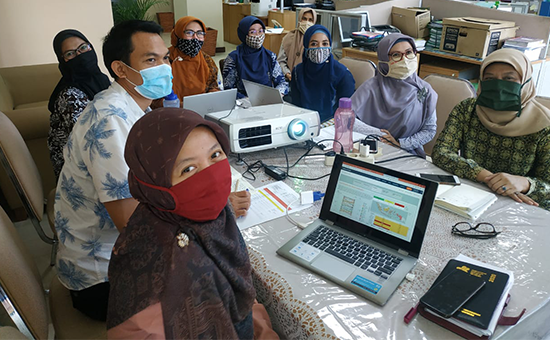
22 Oct HRH2030 Indonesia Wins USAID 2020 Award for Digital Development
HRH2030 Indonesia has been named a winner in the USAID Digital Development Awards, which recognize USAID missions, bureaus, and implementing partners that are leveraging digital tools and technology to support programmatic goals in USAID-funded projects and activities.
The HRH2030 Indonesia activity, funded by USAID, is working to increase the availability and use of quality, real-time data to respond to health workforce challenges, with the goal of improving maternal and newborn health outcomes. The country has an expansive health system, but its delivery of health services is hampered by a maldistribution of the workforce between urban-rural areas; gaps in the skill mix of health graduates to meet the country’s evolving epidemiological and demographic needs; and a fragmented ecosystem of health workforce information systems with disparate stakeholders across the labor market. To respond to these challenges, HRH2030 has been supporting Indonesia’s Ministry of Health (MOH) Board of Human Resources for Health Empowerment and Development (BPPSDMK) to build a connected ecosystem of health workforce data through a three-prong approach, leveraging the principles for digital development:
First, HRH2030 worked with the MOH to strengthen the existing human resource information system (known as the SI-SDMK), providing support to strengthen the system’s functionality to better respond to the needs of users at all levels of the health system. Support included the development of a governance structure to ensure stakeholder coordination, data standardization, and data sharing. Together, the MOH and HRH2030 engaged multiple actors, including the various government ministries involved in the health labor market, professional health worker associations, and local governments, to determine their data needs to facilitate the exchange of data related to their key policy issues and support a multi-sectoral approach to taking action.
Second, the MOH and HRH2030 team developed an interoperability architecture and business intelligence platform. Integrating data from across the health labor market, the platform uses open source systems to support the exchange of data, including DHIS2 to serve as the data warehouse for aggregated health workforce information (called the HRH data warehouse). Through this interoperability architecture, data is not only exchanged between the central level stakeholders who are making policy and planning decisions, but also stakeholders at the local level, enabling them to better manage and optimize the health workforce. Through the business intelligence platform, data visualization software is used to create dashboards to more readily facilitate data analysis for use by all decision makers.
Finally, to sustain these efforts past the life of the HRH2030 project—slated to conclude in August 2021—HRH2030 built capacity within the central level MOH to maintain the data warehouse, continuously develop the interoperability architecture, manage the business intelligence platform, and carry out systematic data analysis and visualization. As well, HRH2030 worked with the central level MOH to build the capacity of provincial, district, and facility level stakeholders to use the health workforce information system ecosystem and improve the quality of data.
HRH2030’s work in Indonesia supports the Government of Indonesia’s own commitment to the health workforce and optimizing information systems, underscored in national policy documents such as the one data policy and mid-term national development plan, the latter which focuses on health workforce strengthening. Their investments in health workforce information proved crucial for supporting health workers during COVID-19, as the MOH was able to rapidly develop and deploy dashboards on the health workforce for reference in decision making during response planning.
HRH2030 Indonesia Project Lead Leah McManus notes that while health workforce data is a critical component of a high-performing health system, the work assumed an even greater importance since the pandemic began.
“Health workers are on the front lines, being asked to protect us during this health emergency while also providing continued access to essential services, such as maternal and child health services,” says McManus. “HRH2030 has been working hand in hand with the MOH’s HRH Directorate and USAID Indonesia over the last three years to develop a digital ecosystem of health workforce stakeholders and systems to improve the availability and quality of data for use by decision makers at all level of the health system. We are honored to receive a 2020 Digital Development Award for this truly collaborative effort, with the Ministry in the driver’s seat. This award recognizes our collective commitment and dedication to Indonesia’s health workforce. We look forward to continuing to support the MOH in their continued efforts to use digital health innovations and empower health workers and decision-makers with the data they need to take action.”
The 2020 Digital Development Award winners were announced by USAID on October 20, 2020, and recognized five winners that use technology to sustain open, secure, and inclusive digital ecosystems and improve measurable development and humanitarian-assistance outcomes on a large scale. Learn more about HRH2030’s Indonesia activity here.





